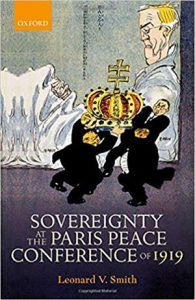Mark Mazower in the Financial Times:
 The 1815 Congress of Vienna was the most important diplomatic encounter of the 19th century. When a Parisian court painter called Jean-Baptiste Isabey depicted the scene, most of the figures around the conference table were aristocrats. Fast forward to its closest 20th-century equivalent — the Paris Peace Conference, convened at the end of the first world war: barely half a dozen out of more than 60 delegates had titles, and of these one was a recent baronet and another a maharajah.
The 1815 Congress of Vienna was the most important diplomatic encounter of the 19th century. When a Parisian court painter called Jean-Baptiste Isabey depicted the scene, most of the figures around the conference table were aristocrats. Fast forward to its closest 20th-century equivalent — the Paris Peace Conference, convened at the end of the first world war: barely half a dozen out of more than 60 delegates had titles, and of these one was a recent baronet and another a maharajah.
The first world war ensured that peacemaking no longer lay in the hands of a few great powers and their landed elites. It was also no more a solely European business. The Americans, excluded from Vienna as irrelevant upstarts, were in Paris in force, and President Woodrow Wilson was the dominant presence. There were Serbs there too, and Greeks, Indians and Japanese.
These events have now moved finally out of living memory, yet the ceremonies that marked the centenary of Armistice Day at the weekend indicate that the first world war has lost none of its importance for us. The peacemakers in 1919 faced a fundamental problem: how to construct international peace in an era of democracy. Today one could hardly say the problem has been solved: globalisation’s failed promise, the US retreat into unilateralism and the rise of the nationalist right have thrown into question the durability of international institutions, norms and arrangements that have lasted decades.
More here.
